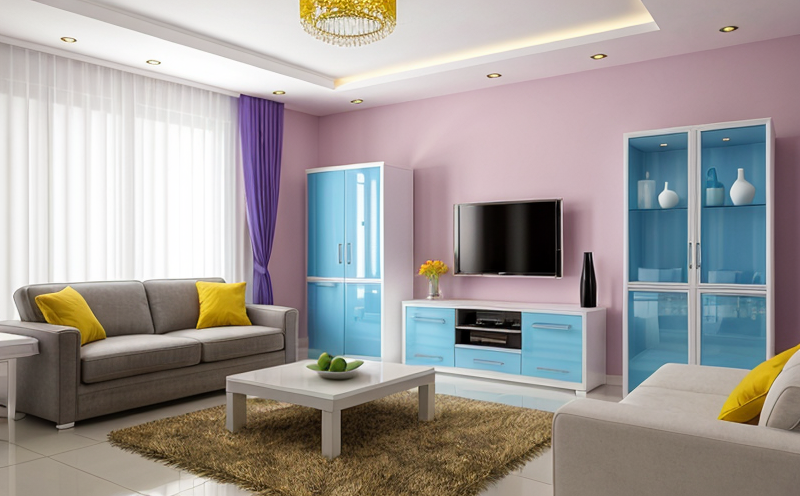ANSI A208 Testing of Plastic Decorative Boards
The ANSI A208 series of standards provides a comprehensive framework to evaluate plastic decorative boards, ensuring they meet stringent quality and safety requirements. These tests are particularly critical for products used in home decoration, where durability, appearance, and compliance with international standards are paramount.
ANSI A208 encompasses various test methods aimed at assessing the physical and mechanical properties of these materials, including dimensional stability, surface characteristics, and resistance to environmental factors such as moisture, heat, and chemical exposure. This testing ensures that decorative boards meet industry expectations for performance in demanding environments.
During ANSI A208 testing, specimens are carefully prepared according to the specified guidelines provided within the standard. The process involves precise measurement of dimensions, surface inspection for defects, and conditioning under controlled environmental conditions prior to testing. This ensures that any observed properties or failures can be attributed solely to the material's inherent characteristics.
The physical tests include compression strength, tensile strength, impact resistance, and modulus of elasticity, all critical in determining a board’s suitability for decorative applications. Additionally, there are specific tests focused on surface quality, colorfastness, and resistance to solvents and chemicals. These tests simulate real-world conditions that the product may encounter during its lifecycle.
Compliance with ANSI A208 is crucial not only for ensuring product reliability but also for maintaining market access in competitive environments where consumer safety is a top concern. By adhering to these standards, manufacturers can demonstrate their commitment to quality and compliance, thereby enhancing brand reputation and customer trust.
In summary, ANSI A208 testing plays an essential role in the development, production, and certification of plastic decorative boards used in home decoration. It ensures that products meet the highest industry standards for performance, durability, and safety, setting a benchmark for quality across the sector.
Scope and Methodology
The ANSI A208 series of tests is designed to evaluate the physical properties and surface characteristics of plastic decorative boards. The scope includes various types of materials commonly used in home decoration, such as vinyl, acrylic, polyester, and composite boards.
The methodology involves several key steps:
- Sample Preparation: Specimens are cut to specific dimensions as defined by the standard. This ensures that all tests are conducted under consistent conditions.
- Conditioning: Samples undergo conditioning in controlled environments to simulate real-world storage and use conditions, such as temperature and humidity.
- Physical Testing: Specimens are subjected to compression, tensile, impact, and modulus of elasticity tests. These tests assess the material's ability to withstand mechanical stress without deformation or failure.
- Surface Inspection: The surface quality is evaluated for defects such as scratches, warpage, and color irregularities. This ensures that the decorative boards meet aesthetic expectations.
- Solvent and Chemical Resistance: Specimens are exposed to a variety of solvents and chemicals to assess their resistance to common household cleaning agents and environmental factors.
The results of these tests provide comprehensive data on the performance and durability of plastic decorative boards, enabling manufacturers to make informed decisions about material selection and product design.
Industry Applications
ANSI A208 testing is widely used in various sectors where high-quality decorative materials are required. These include:
- Furniture Manufacturing: Decorative boards are often used as veneers or face panels for furniture, requiring tests to ensure durability and aesthetic appeal.
- Bathroom Fixtures: Plastics with decorative finishes are commonly used in bathroom fixtures like sinks, cabinets, and countertops. ANSI A208 ensures that these materials can withstand the harsh environments of a bathroom.
- Cabinet Makers: Decorative boards are frequently used in custom cabinet making to enhance visual appeal and provide protection against environmental factors.
- Solid Surface Fabrication: Materials like acrylic are used to create solid surfaces for countertops, bathtubs, and other decorative elements. ANSI A208 testing ensures these materials meet the necessary standards for performance and longevity.
The tests conducted under ANSI A208 provide critical data that helps manufacturers ensure their products meet industry standards and customer expectations. This is particularly important in sectors where aesthetic appeal, durability, and compliance with international regulations are crucial factors.
International Acceptance and Recognition
The ANSI A208 series of tests has gained widespread acceptance across numerous countries due to its rigorous testing protocols and emphasis on quality assurance. Many nations, including the United States, Canada, Europe, and Asia, have adopted these standards as part of their regulatory frameworks.
Recognition of ANSI A208 is particularly significant in markets where strict regulations govern product safety and environmental impact. For instance, the European Union's Reach Directive acknowledges the importance of such testing, ensuring that imported products meet local safety and quality requirements.
The acceptance of these tests extends beyond regulatory compliance to a broader market recognition. Consumers are increasingly aware of the importance of choosing high-quality materials in home decoration, which has driven demand for ANSI A208 compliant products. This international recognition also facilitates trade between countries by ensuring that standards are consistent across borders.
Manufacturers who adhere to ANSI A208 testing not only meet regulatory requirements but also enhance their market competitiveness. By demonstrating compliance with these internationally recognized standards, they can gain a competitive edge in the global marketplace.





